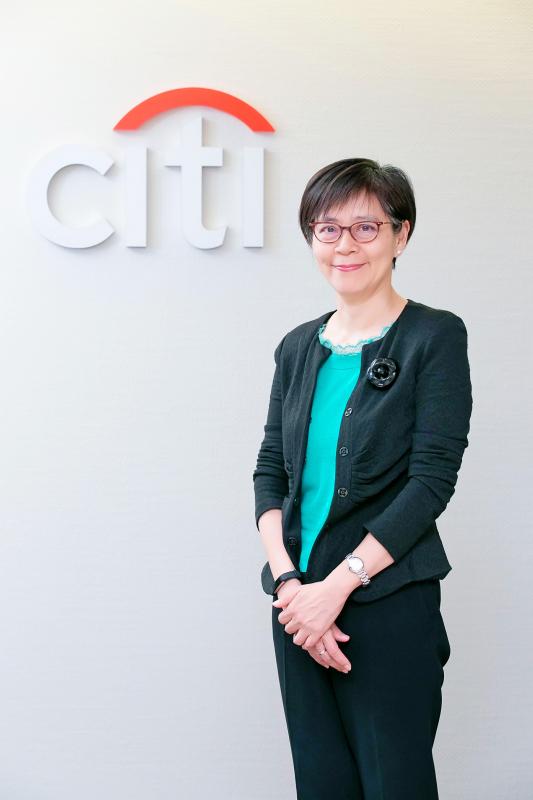Citigroup Inc yesterday announced that Citibank Taiwan Ltd (台灣花旗) president Christie Chang (張聖心) would take on an additional role as Citi’s Asia-Pacific (APAC) corporate banking chairwoman.
In the expanded role, Chang would further leverage her outstanding leadership, rich business experience and the longstanding relationships built with heavyweight clients to help expand Citi’s regional corporate banking business, the group said.
“We look forward to the new leadership building on the strong relationships we have across the region with corporates, financials and public-sector clients, and the 95 percent of the Fortune 500 who bank across the region,” Citi Asia-Pacific head of banking, capital markets and advisory (BCMA) Jan Metzger said in a statement.

Photo courtesy of Citibank Taiwan Ltd
“This is an important appointment and a significant achievement of Christie, reflecting her strong accomplishments on serving clients as a passionate and committed Citibanker, and the professionalism and long-time trust built up with senior clients across industries,” Citibank Taiwan chairman Paulus Mok (莫兆鴻) said in the statement.
Chang serves as president of Citibank Taiwan and head of Taiwan BCMA, and is responsible for managing and providing corporate and investment banking services to Citi’s institutional clients.
Under her leadership, Citibank Taiwan performed remarkably in corporate banking last year, including supporting top-notch clients to expand their global footprint and executing several landmark mergers and acquisitions, as well as fundraising plans.
Citi’s corporate banking division is a leading provider of financial services to top-tier multinational clients around the world.
The company has advised on more than US$100 billion of mergers and acquisitions in the Asia-Pacific region and helped raise more than US$150 billion from capital markets for Asian clients in the past 12 months.
Chang’s expanded role will give Citi a deeper understanding of industry trends and market knowledge, Citi said.
It would also enable the company to provide a steady stream of innovative cross-border and local financial solutions tailored to the specific needs of clients, it said.
Chang joined Citibank in 1989 as a management associate and has served for more than 30 years, it said.
Citibank Taiwan’s achievements in corporate banking are widely recognized.
Last year, the lender won the “Best International Investment Bank” award from FinanceAsia and Asiamoney. It also received key honors of “Best Corporate and Institutional Bank,” “Best M&A Adviser” and “Best Corporate Bond” at The Asset Triple A Awards.
Citibank Taiwan reported NT$14.672 billion (US$490.70 million) in earnings before interest and taxes for last year, jumping 13 percent from a year earlier and the best annual result since 2013.

CAUTIOUS RECOVERY: While the manufacturing sector returned to growth amid the US-China trade truce, firms remain wary as uncertainty clouds the outlook, the CIER said The local manufacturing sector returned to expansion last month, as the official purchasing managers’ index (PMI) rose 2.1 points to 51.0, driven by a temporary easing in US-China trade tensions, the Chung-Hua Institution for Economic Research (CIER, 中華經濟研究院) said yesterday. The PMI gauges the health of the manufacturing industry, with readings above 50 indicating expansion and those below 50 signaling contraction. “Firms are not as pessimistic as they were in April, but they remain far from optimistic,” CIER president Lien Hsien-ming (連賢明) said at a news conference. The full impact of US tariff decisions is unlikely to become clear until later this month

Popular vape brands such as Geek Bar might get more expensive in the US — if you can find them at all. Shipments of vapes from China to the US ground to a near halt last month from a year ago, official data showed, hit by US President Donald Trump’s tariffs and a crackdown on unauthorized e-cigarettes in the world’s biggest market for smoking alternatives. That includes Geek Bar, a brand of flavored vapes that is not authorized to sell in the US, but which had been widely available due to porous import controls. One retailer, who asked not to be named, because

CHIP DUTIES: TSMC said it voiced its concerns to Washington about tariffs, telling the US commerce department that it wants ‘fair treatment’ to protect its competitiveness Taiwan Semiconductor Manufacturing Co (TSMC, 台積電) yesterday reiterated robust business prospects for this year as strong artificial intelligence (AI) chip demand from Nvidia Corp and other customers would absorb the impacts of US tariffs. “The impact of tariffs would be indirect, as the custom tax is the importers’ responsibility, not the exporters,” TSMC chairman and chief executive officer C.C. Wei (魏哲家) said at the chipmaker’s annual shareholders’ meeting in Hsinchu City. TSMC’s business could be affected if people become reluctant to buy electronics due to inflated prices, Wei said. In addition, the chipmaker has voiced its concern to the US Department of Commerce

STILL LOADED: Last year’s richest person, Quanta Computer Inc chairman Barry Lam, dropped to second place despite an 8 percent increase in his wealth to US$12.6 billion Staff writer, with CNA Daniel Tsai (蔡明忠) and Richard Tsai (蔡明興), the brothers who run Fubon Group (富邦集團), topped the Forbes list of Taiwan’s 50 richest people this year, released on Wednesday in New York. The magazine said that a stronger New Taiwan dollar pushed the combined wealth of Taiwan’s 50 richest people up 13 percent, from US$174 billion to US$197 billion, with 36 of the people on the list seeing their wealth increase. That came as Taiwan’s economy grew 4.6 percent last year, its fastest pace in three years, driven by the strong performance of the semiconductor industry, the magazine said. The Tsai